Select Language
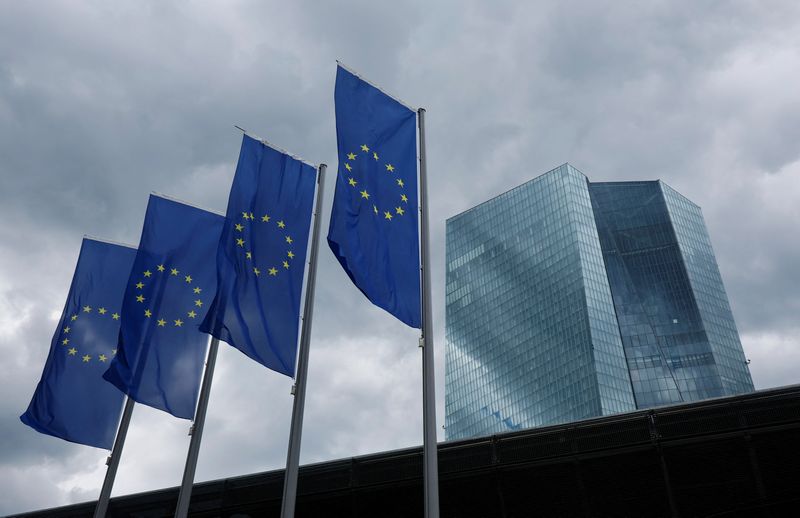
By Balazs Koranyi and Francesco Canepa
FRANKFURT (Reuters) - European Central Bank interest rates have room to fall further as inflation moderates, ECB board member Piero Cipollone said, warning that the U.S. administration's trade war with China could have a detrimental impact on the 20-member euro zone.
The ECB has lowered borrowing costs five times since June as growth concerns start to trump price worries, and investors see at least three more rate cuts this year in a bid to boost an economy struggling to rebound from two years of near stagnation.
"We all agree there is still room for adjusting rates downwards," Cipollone told Reuters in an interview. "We are almost on target...(and) we are still in restrictive territory."
But higher energy prices and global trade tensions are tugging the ECB in different directions, so there is no sense in committing to any specific move for now, including a widely anticipated and fully priced in cut in March, Cipollone added.
Still, the euro zone economy has not fundamentally changed since December, when the ECB's projections assumed four rate cuts in 2025, including a move already delivered in a unanimous decision last month.
"The overall understanding of where we are going is there, the fundamentals haven’t changed, so I do not expect a big change in direction," Cipollone said. "This convergence with the inflation target is coherent with a declining interest rate path."
Inflation inched up to 2.5% last month but the ECB sees it back at 2% sometime this summer after four years above target.
CHINA RISK
The big uncertainty is U.S. trade policy and that could hit Europe hard, even before any direct trade barriers on the bloc, Cipollone argued.
"What concerns me more is if President Trump engages in a full trade war with China," Cipollone, the newest member of the ECB's board, added. "This is a more serious threat because China has 35% of the world’s manufacturing capacity."
The U.S. imposed a 10% tariff on all Chinese imports this week, prompting retaliatory measures from Beijing.
Curtailing access to the U.S. would force China to find other markets and it could dump discounted products on Europe, curbing growth and prices, Cipollone said.
Models compiled by the Peterson Institute for International Economics, a Washington-based think tank, concluded that while the imposition of tariffs would see the U.S. itself take a hit to growth, it would suffer less than any of its targets.
However, Cipollone appeared to downplay the impact of potential tariffs directed at Europe.
He said firms could absorb some of the higher costs by sacrificing profit margin while the euro's inevitable weakening against the U.S. dollar would also buffer the bloc.
Trade strife could drag economic growth down but not enough to induce a recession, especially since other parts of the economy are showing resilience.
Cipollone noted that the labour market is holding up, consumption is likely to rebound, construction is strong, rate cuts are feeding through to the economy and even industry, in recession for the past two years, is showing signs of bottoming out.
"We might not be booming but I am not expecting a recession at all," he said.
Even if trade tensions threaten to drag inflation lower, other factors, particularly energy costs, were pulling prices in the other direction, so risks to the outlook remained balanced, even if some policymakers fear the ECB could undershoot its target.
Click here for the full Q&A of the interview.
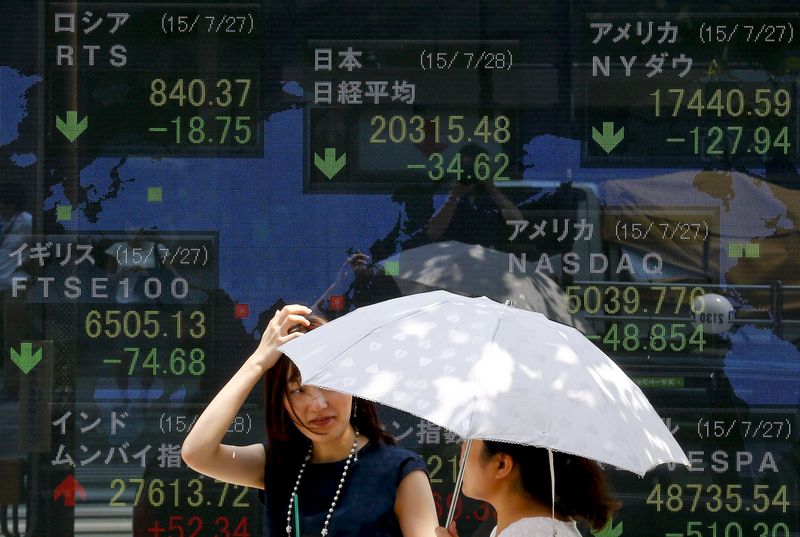
Investing.com– Most Asian stocks were higher on Thursday as the broader tech sector rose tracking Wall Street gains, though escalating U.S.-China trade tensions tempered overall optimism.
U.S. stock index futures edged higher in Asian trade after Wall Street saw gains in tech stocks after NVIDIA (NASDAQ:NVDA) forecasted solid capital spending on artificial intelligence.
Tracking their peers, heavyweight Asian tech stocks were also on the rise, leading to broad-based gains in the region.
Regional tech stocks jump on AI optimism
Despite the imposition of 10% tariffs by the Donald Trump administration on Chinese goods, China's AI sector, led by companies like DeepSeek, has demonstrated resilience, bolstering investor confidence.
The enthusiasm surrounding DeepSeek has been a key factor in offsetting concerns related to the ongoing trade tensions between the U.S. and China.
As a result, China’s Shanghai Composite rose 0.8% on Thursday, while the Shanghai Shenzhen CSI 300 index gained 0.7%. Hong Kong’s Hang Seng index advanced 0.4%.
Hong Kong-listed Semiconductor Manufacturing International Corp (HK:0981) (SMC) shares hit their record high, while Sunny Optical (OTC:SNPTF) Technology (HK:2382) stock jumped 6.1%.
In Tokyo, the Nikkei 225 gained 0.3%. Semiconductor giant Tokyo Electron (TYO:8035) saw its shares climb 1.8%, while Sony Corp (TYO:6758) added 1.2%.
Renesas Electronics Corp (TYO:6723) surged 12% following robust earnings for the December quarter.
South Korea's KOSPI index rose 0.5%, with Samsung Electronics (KS:005930) and SK Hynix Inc (KS:000660) adding 1.1% and 2.7%, respectively.
US-China tariff concerns persist, limiting gains
However, the upside was limited as investors remained cautious ahead of the implementation of China's retaliatory tariffs on U.S. imports, set to take effect next week.
The ongoing trade tensions have prompted global investors to adopt a more cautious stance toward riskier assets.
Singapore's Straits Times Index gained 0.4%, buoyed by strong performances in the financial and technology sectors.
Singapore Exchange Ltd (SGX:SGXL) reported a 27% rise in its half-yearly profit on Thursday. The bourse operator’s stock rose nearly 1%.
Elsewhere, India's Nifty 50 Futures were largely muted on Thursday.
Australia's S&P/ASX 200 index advanced 0.7%, with technology and mining stocks leading gains.
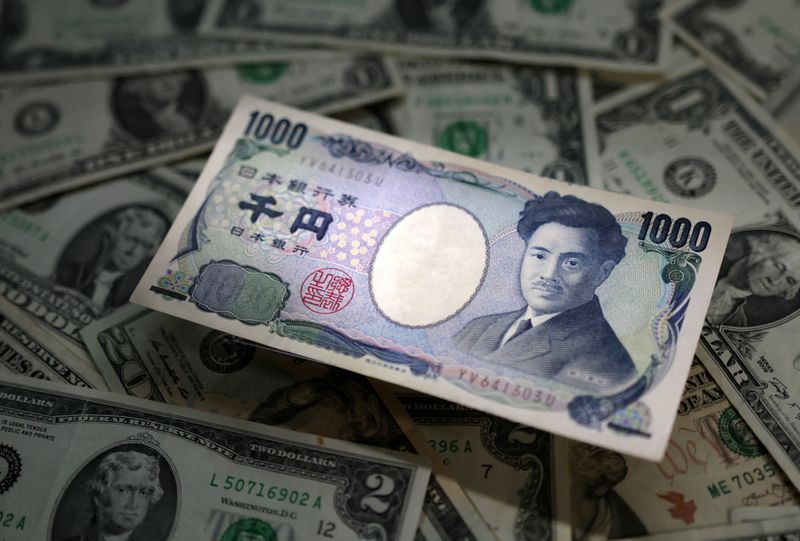
By Kevin Buckland
TOKYO (Reuters) - The U.S. dollar slumped to an eight-week trough to the yen and lingered near a one-month low versus sterling on Thursday, as investor nerves about an inflation-stoking global trade war abated.
Japan's currency was also supported by rising expectations for further Bank of Japan interest-rate hikes with a central bank official advocating continued rate hikes, a day after strong wage data.
Sterling was firm even with the Bank of England widely expected to cut rates by a quarter point later in the day.
The dollar sank 0.5% to 151.81 yen by 0140 GMT, the lowest since December 12, adding to a 1.1% slide on Wednesday.
Sterling was steady at $1.2509, after rising as high as $1.2550 in the previous session for the first time since January 7.
The euro was flat at $1.0401 after edging up 0.2% on Wednesday.
The dollar index - which measures the U.S. currency against the euro, sterling, yen and three other major peers - stood at 107.57, not far from its overnight low of 107.29.
The index had jumped to a three-week high of 109.88 at the start of the week as Trump looked poised to impose 25% import tariffs on Mexico and Canada, but the countries won last-minute, one-month reprieves - although Washington did slap 10% tariffs on China.
The offshore yuan strengthened slightly to 7.2775 per dollar.
Canada's loonie was steady at C$1.4321 versus its U.S. counterpart after rising to the highest since December 17 at C$1.4270 overnight. The Mexican peso was steady at 20.5789 per dollar.
"It appears that the market has started to put the tariff threats against Mexico and Canada in the rear view mirror and is treating the China tariffs as business as usual," said James Kniveton, a senior corporate FX dealer at Convera.
"Two (U.S.) rate cuts are still anticipated by the end of the year, but with the diminishing likelihood of tariffs contributing to inflation, there appears to be greater flexibility for the Federal Reserve."
The next major test for the U.S. monetary policy outlook is monthly payrolls figures due Friday.
A quarter-point Fed cut is fully priced for July, with markets expecting 46.3 basis points of cuts by the December meeting, according to LSEG data.
Meanwhile, market-implied odds for an imminent BoE rate reduction stand at 92%. For the BOJ, the market has priced in around 94.8% odds for a quarter-point hike by September.
BOJ board member Naoki Tamura said on Thursday that the central bank must raise rates to at least 1% or so in the later half of fiscal 2025 with upward risks to prices rising.
A day earlier, data showed a second-straight month of growth for real wages.
(This story has been corrected to say basis points, not percentage points, in paragraph 14)
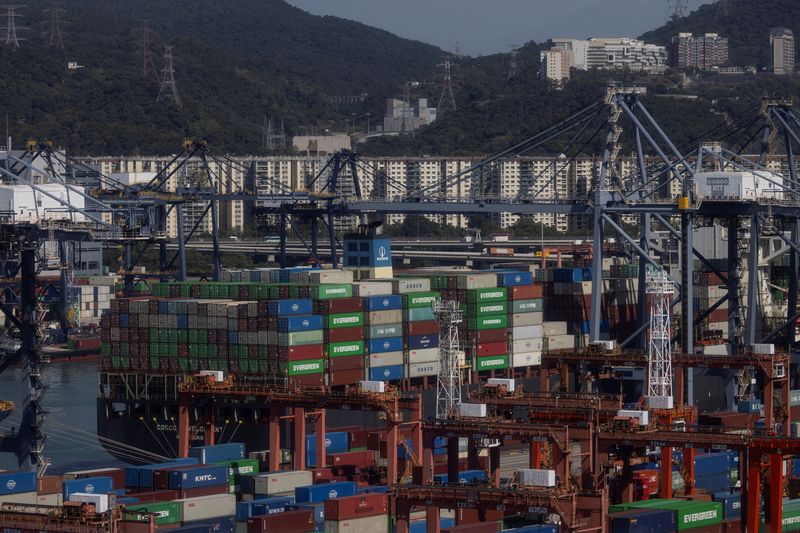
By David Lawder
WASHINGTON (Reuters) - China filed a World Trade Organization complaint on Wednesday against U.S. President Donald Trump's new 10% tariff on Chinese imports and his cancellation of a duty-free exemption for low-value packages, arguing the actions are "protectionist" and break WTO rules.
Beijing's request for U.S. trade consultations came as confusion reigned among shippers and retailers over Trump's closure of the "de minimis" exemption for package imports valued under $800 and widely used by e-commerce firms including Shein, Temu and Amazon (NASDAQ:AMZN).
A Customs and Border Protection official said all small packages from China and Hong Kong needed to have customs entries on file prior to arrival and there was the potential for some cargo to be sent back without this paperwork.
The WTO said China submitted a request for consultations with the U.S. on the tariffs. China argues in the document that Trump's new duties aimed at halting the flow of fentanyl opioids and their precursor chemicals to the U.S. "are imposed on the basis of unfounded and false allegations concerning China."
It said the duties are discriminatory, only applying to goods of Chinese origin, and are inconsistent with the U.S.'s WTO obligations.
The request for consultations is the start of a dispute process that could lead to a ruling that Trump's duties violated trade rules in the same manner that a 2020 WTO ruling found that his first-term China tariffs broke trade regulations.
But such a victory would be unlikely to bring Beijing relief because the WTO's Appellate Body has been largely inoperable for years, as the U.S. has blocked the appointment of appellate judges over what it views as judicial overreach by the body. This has prohibited a final decision in the 2020 case.
PACKAGE CHAOS
The U.S. Postal Service said on Wednesday it would again accept parcels from China and Hong Kong, reversing a temporary suspension that threatened to disrupt millions of package imports every day.
"We're all running around like headless chickens at this moment in time, trying to second-guess what's going to happen," said Martin Palmer, co-founder of Hurricane Commerce, a cross-border e-commerce data provider. "And in two weeks' time we may be back to normal."
The Trump administration has blamed the de minimis exemption for allowing fentanyl and its precursor chemicals to enter the U.S. unscreened. Recent Reuters reporting has also found that drug traffickers are exploiting the exemption.
USPS said in a statement it was working with the U.S. Customs and Border Protection agency to implement an efficient collection mechanism for the new China tariffs to minimize disruptions to deliveries.
NO TRUMP-XI TALKS
On Wednesday, there was still no call scheduled between Trump and Chinese President Xi Jinping to discuss the new U.S. tariffs and Beijing's retaliatory measures, a person familiar with the matter told Reuters.
Trump said on Tuesday he was in no hurry to speak with Xi as the tariff took effect just after midnight Eastern Time.
China responded with targeted tariffs on imports of U.S. coal, liquefied natural gas, crude oil and farm equipment, and opened an anti-monopoly investigation into Alphabet (NASDAQ:GOOGL)'s Google.
The launch of the new trade war caught the retail and shipping sectors flat-footed.
"There has really been absolutely zero time for anyone to prepare for this," said Maureen Cori, co-founder of New York-based consultancy Supply Chain Compliance. "What we really need is direction from the government on how to handle this without warning or notice."
Currently, de minimis parcels are consolidated so customs can clear hundreds or thousands of shipments at once, but they will now require individual clearances, significantly increasing the burden for postal services, brokers and customs agents, Cori said.
The provision was initially intended as a way to streamline trade, and its use has surged with the increase in online shopping.
About 1.36 billion shipments entered the United States using the de minimis provision in 2024, up 36% from 2023, according to U.S. Customs and Border Protection (CBP) data.
TARIFF UNCERTAINTY
U.S. Treasury Secretary Scott Bessent on Wednesday defended Trump's tariff strategy in his first media interview since taking office, saying it was aimed at bringing manufacturing back to the U.S., including for industries that have largely left U.S. shores.
U.S. Federal Reserve officials on Wednesday pointed to the large policy uncertainty around tariffs and other issues arising from the early days Trump's administration as among the top challenges in figuring out where to take U.S. monetary policy in the months ahead.
Chicago Fed President Austan Goolsbee warned that ignoring the potential inflationary impact of tariffs would be a mistake, whereas Richmond Fed President Thomas Barkin said it remains impossible at this early stage to know where cost increases from any tariffs might be absorbed or passed along to consumers.
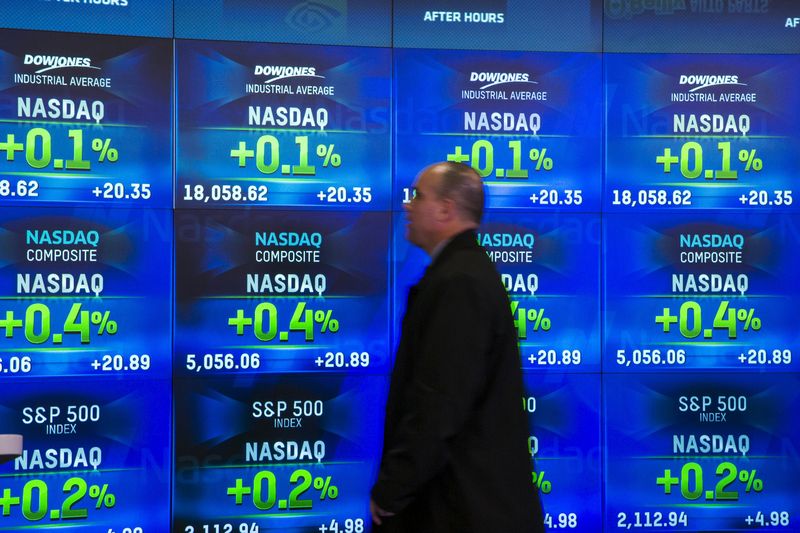
Investing.com--The S&P 500 closed higher Wednesday, as falling Treasury yields and a surge in Nvidia helped stocks shrug off a slide in Alphabet.
At 4:00 p.m. ET (21:00 GMT), the Dow Jones Industrial Average rose 317 points, or 0.7%, the S&P 500 index rose 0.4%, and the NASDAQ Composite added 0.2%.
Alphabet slides as Q4 earnings underwhelm, but Nvidia (NASDAQ:NVDA) jumps helps boost tech
Alphabet (NASDAQ:GOOGL) fell more than 7% after its fourth-quarter revenue missed expectations and slowing growth in its cloud division, which is closely tied to AI. The tech giant is also set to ramp up investment spending by more than analysts had expected, which is likely to weigh on free cash flow.
The search giant said it plans to spend $75 billion on building out its artificial intelligence capabilities this year, well above the $58 billion in capital expenditures pencilled in by analysts.
Still, some on Wall Street continue to back the tech giant, citing a rapidly growing AI market.
"GOOGL [Alphabet] remains at the forefront of the AI race, which is likely to expand the TAM for Search and Cloud, fuel growth higher for longer and drive shareholder value," Truist Securities said in a note.
Other hyperscalers are expected to follow Alphabet's plans to bolstered spending that will likely benefit chipmaker Nvidia, which ended the day up 5%.
Apple (NASDAQ:AAPL) stock cut losses to close around the flatline after Bloomberg reported that Chinese regulators are considering whether to open a formal probe into the iPhone giant’s App Store fees and policies.
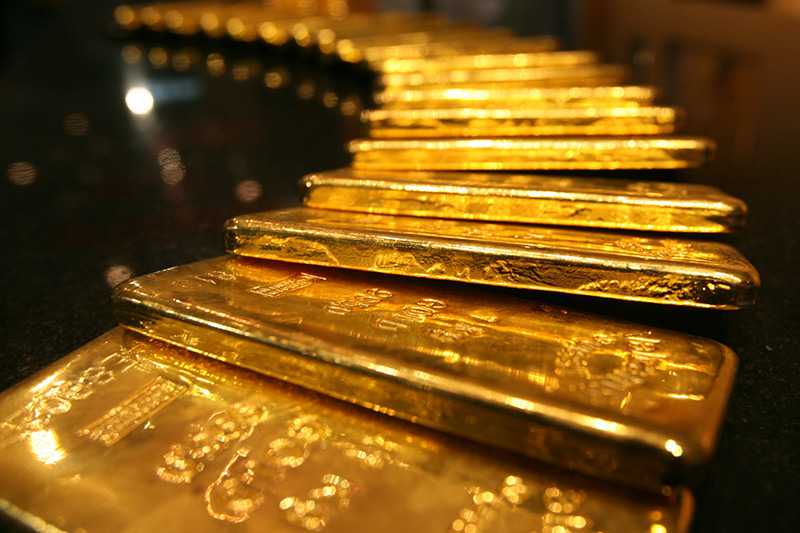
Investing.com-- Gold prices hit a record high in Asian trade on Wednesday as safe haven demand for the yellow metal was underpinned by persistent concerns over a brewing trade war between the U.S. and China.
U.S. President Donald Trump’s comments on the U.S. taking over the Gaza strip and relocating Palestinians from the region also drove haven demand, given that it drew a sharp rebuke from several countries in the region.
Bullion prices were also aided by weakness in the dollar, which wiped out all of its gains this week after U.S. President Donald Trump postponed trade tariffs on Mexico and Canada.
But Trump offered no such relief to China, keeping traders largely biased towards safe havens. China also retaliated against U.S. trade tariffs on Tuesday.
Spot gold jumped 0.6% to a record high of $2,858.27 an ounce, while gold futures expiring in April rose 0.4% to $2,885.39 an ounce.
Gold surges as US-China trade tensions simmer
Bullion prices benefited from safe haven buying after Trump’s 10% tariffs on China took effect from Tuesday. Beijing retaliated to this with its own import tariffs, export controls, as well some measures against select U.S. companies, such as Google (NASDAQ:GOOGL).
Trump also signaled that he was in no hurry to talk to Chinese President Xi Jinping, lessening the possibility of a de-escalation in trade tensions. Trump’s tariff relief for Canada and Mexico came only following dialogue with their heads of state.
A Sino-U.S. trade war stands to potentially disrupt global trade, and is expected to pressure growth in the world’s biggest economies.
Trump’s China tariffs also sparked fears that he will make good on his threats to impose universal trade tariffs, as well as targeted duties on Taiwan and Europe.
Still, analysts expect any prolonged trade tariffs to push up U.S. inflation and keep interest rates high for longer. Such a scenario could diminish gold’s long-term prospects.
Other precious metals dipped on Wednesday. Platinum futures fell slightly to $1,011.30 an ounce, while silver futures fell 0.3% to $32.938 an ounce.
Among industrial metals, benchmark copper futures on the London Metal Exchange steadied at $9,193.50 a ton, while March copper futures were flat at $4.3675 a pound.
Gaza uncertainty increases after Trump comments
Haven demand was also boosted by Trump proposing a U.S. takeover of the Gaza strip, after proposing that the Palestinians in the region should be resettled.
Trump said during a White House conference with Israeli Prime Minister Benjamin Netanyahu that the U.S. will “take over” the Gaza Strip, level the site and rebuild it as an economic development. He also repeated his calls to relocate Palestinians from Gaza into neighboring states.
Trump’s comments- which were scant on details, but could upturn decades of U.S. policy in the Middle East- drew sharp rebukes from Palestinian leaders and Arab countries.
This drove up concerns over renewed geopolitical tensions in the Middle East.

BENGALURU - Growth in India's dominant services sector was the slowest in over two years in January amid cooling demand but remained historically strong and led to a substantial rate of hiring, a business survey showed on Wednesday.
Asia's third-largest economy has been struggling with slackening consumption. To try and boost spending the government gave some tax relief to the middle class at its annual budget on Feb. 1 but shied away from announcing big reforms which are much needed to prop up growth.
The HSBC final India Services Purchasing Managers' Index, compiled by S&P Global, fell to 56.5 in January from 59.3 in December, a tad lower than a preliminary estimate of 56.8 but comfortably ahead of the 50-mark separating contraction from growth.
"The business activity and new business PMI indices eased to their lowest levels since November 2022 and November 2023 respectively," said Pranjul Bhandari, chief India economist at HSBC.
"That said, new export business partly countered the downtrend and continued to rebound from a dip in late-2024, in line with official data."
Demand for services rose at the slowest pace in 14 months but remained sturdy. It was supported by international demand that was the strongest in five months.
The future activity sub-index moderated to a three-month low but the fall was insignificant and firms hired new staff at one of the fastest paces since the inception of the survey in December 2005.
Inflationary pressures picked up, as both input costs and prices charged rose at a strong pace.
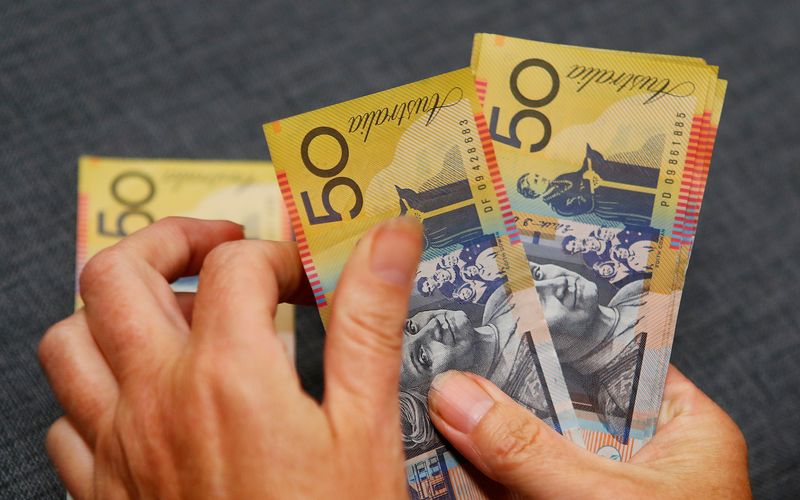
By Rae Wee
SINGAPORE (Reuters) -The yuan sank on Wednesday as a new Sino-U.S. trade war shook Chinese markets returning from an extended Lunar New Year break, while the yen jumped on rising bets of further Bank of Japan (BOJ) rate hikes this year.
The dollar rose more than 0.5% against the yuan to a high of 7.2856 shortly after onshore trading opened despite the People's Bank of China (PBOC) setting a stronger-than-expected yuan midpoint rate, around which the currency is allowed to trade in a 2% band.
The fixing had been closely watched by investors for clues on whether Beijing would allow for a weaker currency to blunt the impact of sweeping new tariffs imposed by U.S. President Donald Trump.
China on Tuesday slapped tariffs on U.S. imports in a swift response to the U.S. duties on Chinese goods, and Trump said the same day he is in no hurry to speak to Chinese President Xi Jinping to try to defuse a new trade war between the world's two largest economies.
"Our base case is that China will increase its tolerance for currency weakness in response to the U.S. tariffs," said Carol Kong, a currency strategist at Commonwealth Bank of Australia (OTC:CMWAY) (CBA).
"I think ultimately, allowing the yuan to weaken will be one of the responses China takes, and I would expect further retaliation from China if the U.S. retaliates with even more tariffs."
The offshore yuan was little changed at 7.2892 per dollar on Wednesday, after falling to a record low of 7.3765 per dollar at the start of the week.
The Australian dollar, often used as a liquid proxy for the yuan, was a touch weaker at $0.6247, though was still clinging on to its 0.47% overnight gain. Its New Zealand counterpart last fetched $0.5653.
In the broader market, volatility in currencies eased a little after a turbulent start to the week following Trump's imposition of steep tariffs on top U.S. trading partners, with those on Mexico and Canada having since been delayed following negotiations.
The dollar was on the back foot, giving some respite to heavily battered currencies like the euro, which bounced back above the $1.02 level and last bought $1.0374.
The yen was a notable mover in the Asian session as it rose more than 0.5% to its highest in over a month at 153.47 per dollar. The impetus came from data that showed Japan's December inflation-adjusted real wages rose 0.6% year-on-year thanks to a wintertime bonus bump, with government officials expressing optimism that wage hike momentum is growing.
That left traders ramping up bets of more BOJ rate hikes this year, with just over 30 basis points priced in by the year-end.
"The upcoming spring wage rounds will be closely watched, as expectations grow of more BOJ tightening," said Alvin Tan, head of Asia FX strategy at RBC Capital Markets.
"As we have seen for more than a year, BOJ tightening by itself is not adequate to drive the yen into an appreciation trend, but that along with the yen's under-valuation might be enough to cap yen weakness particularly in a more uncertain global macro environment."
Elsewhere, the Canadian dollar rebounded from Monday's 22-year low and last stood at C$1.4331.
The Mexican peso was steady at 20.4840 per dollar, moving away from a trough of 21.2882 hit on Monday, its weakest level in nearly three years.
Sterling was similarly a touch higher at $1.2484, while the dollar index fell 0.07% to 107.97.
"I am actually quite surprised at the resilience of markets. Risk sentiment...has been quite positive despite all the tariff headlines and the resumption of the U.S.-China trade war," said CBA's Kong.
"I think part of the optimism stems from the fact that the U.S. was willing to delay tariffs as long as the other countries gave Trump what he wanted."
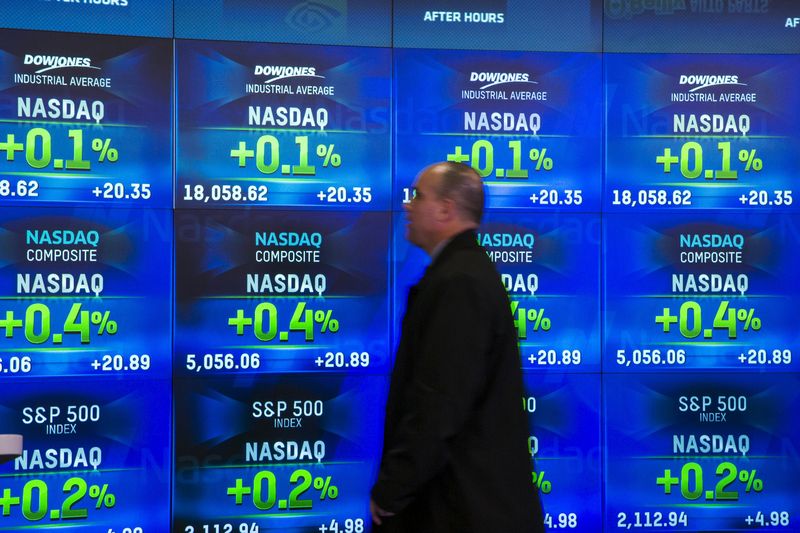
Investing.com-- U.S. stock index futures fell on Tuesday evening, pressured chiefly by losses in technology stocks as underwhelming earnings from Google owner Alphabet raised more questions about artificial intelligence demand.
Futures retreated after a positive session on Wall Street, as investors were relieved by President Donald Trump postponing plans to impose steep trade tariffs on Canada and Mexico. But Trump’s tariffs on China still took effect, drawing ire and retaliation from Beijing.
Concerns over a brewing trade war had battered Wall Street on Monday, with U.S. stock benchmarks still struggling to recover from those losses.
S&P 500 Futures fell 0.4% to 6,042.25 points, while Nasdaq 100 Futures fell 0.5% to 21,569.0 points by 19:05 ET (00:05 GMT). Dow Jones Futures fell 0.1% to 44,642.0 points.
Alphabet slides as Q4 earnings underwhelm
Alphabet’s class A shares (NASDAQ:GOOGL) slid 7.4% in aftermarket trade, after the company’s fourth-quarter revenue missed expectations, especially on disappointing earnings from its cloud division, which is closely tied to AI.
The print raised questions about just how much of an earnings driver AI was, following a similar pattern from peer Microsoft’s earnings last week. Alphabet, like Microsoft (NASDAQ:MSFT), signaled that it will spend vast amounts of capital on AI in 2025.
Wall Street’s AI spending has come under heightened scrutiny in recent weeks, especially with the release of China’s DeepSeek R1 AI model, which appeared to operate on a substantially smaller budget.
This had triggered a massive rout in tech valuations last week, one that Wall Street is still struggling to recover from. Alphabet’s earnings could trigger a fresh tech rout, although the company’s Wall Street peers were largely unchanged in aftermarket trade.
Wall St shrugs off China trade jitters; more earnings awaited
Wall Street indexes ended Tuesday’s session higher, aided by a round of dip buying after steep losses on Monday.
Investors largely looked past a brewing trade war with China, after Trump’s 10% tariffs against the country took effect. Beijing retaliated with its own import tariffs and export controls, and also launched an antitrust investigation into Google.
Trump signaled that he was in no hurry to negotiate with Chinese President Xi Jinping, with the tariffs now set to remain in place for the foreseeable future.
Analysts warned that increased trade tariffs- which will be borne by U.S. importers, could underpin inflation and pressure growth.
The S&P 500 rose 0.7% to 6,037.83 points, while the NASDAQ Composite rose 1.4% to 19,654.02 points on Tuesday. The Dow Jones Industrial Average rose 0.3% to 44,556.04 points.
More major earnings are on tap this week, with magnificent seven member Amazon.com Inc (NASDAQ:AMZN) set to report on Thursday. Before that, prints from Uber Technologies Inc (NYSE:UBER), Walt Disney Company (NYSE:DIS), Qualcomm Incorporated (NASDAQ:QCOM), and MicroStrategy Incorporated (NASDAQ:MSTR) are due on Wednesday.
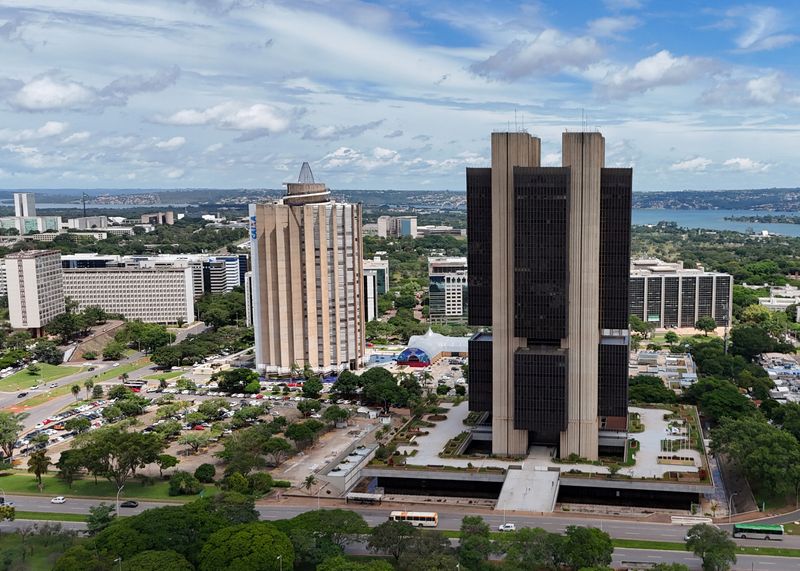
By Marcela Ayres
BRASILIA (Reuters) - Brazil's Treasury on Tuesday estimated that federal public debt will rise up to 16% this year, as bonds linked to the benchmark interest rate potentially exceed half of total debt, exposing them to the central bank's aggressive push to tame inflation and making it costlier for the country to service its debts.
The Treasury's annual financing plan sees debt ranging from 8.1 trillion reais to 8.5 trillion reais ($1.47 trillion) in 2025, up from the 7.316 trillion reais recorded in December.
It also stressed the continued strategy of issuing conventional and sustainable bonds to provide a reference for the Brazilian sovereign yield curve, adding it "may use external liability management operations to enhance the efficiency of the yield curve."
The Treasury estimated that the share of debt linked to the benchmark Selic interest rate will account for 48% to 52% of the total this year, after rising to 46.3% in 2024.
These floating-rate bonds, known as LFTs, reached their highest share in 20 years last year, amid intense volatility from shifting interest rate expectations in the U.S. and concerns over Brazil's growing indebtedness.
According to Treasury Secretary Rogerio Ceron, the strategy of increasing the share of floating-rate bonds aligns with market appetite.
"There is no point in working against market demand," he said at the press conference.
Such securities are typically more appealing to investors during periods of heightened risk perception but leave debt costs vulnerable to sharp increases when interest rates go up.

